The Way Ahead has conducted three surveys among young professionals (YPs) to understand preferences between the technical and managerial career ladder. Approximately two-thirds of respondents sought to pursue a management career. It is estimated that one-third ultimately follow the managerial career path. Why do YPs see management as an attractive career? TWA is trying something new in this Forum section and asked select technical and managerial industry leaders for comments on key questions this survey raised. Let’s hear what experienced technical and managerial professionals have to say on this critical subject.
A total of 2,799 experienced professionals over 35 years of age responded to the survey—60% are on technical career paths and 40% in management positions. The results are representative at the 95% confidence level with a ± 1.79 margin of error. This survey aims to address questions regarding the technical vs. managerial ladder not previously investigated. All data collected, analyzed, and presented in previous articles, workshops, and papers were missing the perspective of professionals over the age of 35. Oil and gas industry veterans now share their experiences regarding the evolution of their career path and job selections. Responses provide suggestions on how organizations can motivate and retain young professionals (YPs) by effectively communicating the company’s view on their potential. This survey is not designed to dissuade YPs from pursuing the management career option, but aims to explore the differences between technical and managerial career paths and share corporate expectations about what is required to succeed in both.
Technical Professionals’ Responses
This section captures responses from 1,683 senior technical professionals. Responders have more than 10 years of experience with approximately half more than 26 years of experience.
To be or not to be. Previous surveys showed that YPs view senior management positions as “career success” when compared with the perception that there are few parallel technical positions. YPs see those on a managerial career ladder receiving accolades, recognition, and financial incentives. Is this image consistent with reality? What are the tradeoffs? Survey respondents working in both technical and managerial positions indicate that technical success can be extremely satisfying and enjoyable, as well as often more stable and less stressful than dealing with the administration of people and organizational bureaucracy. Almost all current industry managers progressed through technical roles and are ultimately confronted with intense work commitments, employee issues, and corporate institutional requirements.
Of the respondents, 73% of experienced professionals on the technical ladder aspired to become managers. This supports findings in past TWA surveys of YPs. With a clear majority expressing interest in pursuing a managerial career ladder, a deeper investigation into what influences career path choices is warranted. What are the primary motivating factors? How do these change over the course of a career? What is the view from those who have made the transition?
A Matter of Choice. Our industry offers a great diversity of career options. When asked about managerial ambitions, the vast majority of technical professionals were seeking technically focused managerial roles, with only 13% seeking positions focused on business and people management (Fig. 1). What key factors separate a technical management position from an individual technical contributor position? Open responses to this question provide some insight.
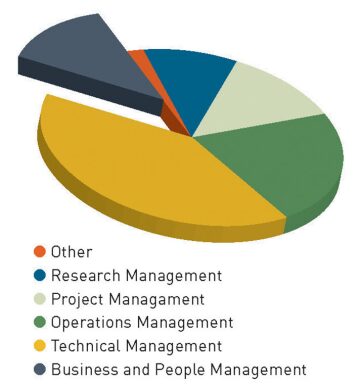
Experienced technical professionals primarily pursue management for the perceived power, status, and decision-making authority. Salary and benefits ranked second in importance, followed by the desire to find a more interesting job with greater top-level career advancement opportunities. Status and influence over corporate direction were verified as the primary drivers behind the preference for a managerial career with 67% of technical professionals stating that they sought to become a manager even if equivalent benefits and authority over small expenditures was offered in their current technical role. There was no appreciable reduction in the interest in a managerial career until late in the career when it became obvious that the opportunities would never be realized.
In your mid-30s, your employer will probably expect you to be master of your discipline, part of the technical core of the company. MBA-type training is largely wasted if you have no real business experience; you can do this later. —Ian Craig, CEO, Sakhalin Energy Investment
Technical professionals expressed concern about being managed by those less technically proficient than they are. As one respondent put it, “Managers rushing out of the technical ranks early in their careers may be accepted by managerial colleagues, but their employees will likely not respect them as much. So, to be an effective leader and earn the respect of your people, you need solid technical skills and need to have put your time in before moving into management.”
Making A Transition
Given the above findings, what happens when the opportunity finally arises to take a managerial position? What happens to those never offered that opportunity? In the survey, 76% of technical professionals said they got an opportunity to assume a managerial role at some time in their career. The offer mostly came from their current employer ( Fig. 2 ). This response indicates that an opportunity to transition to management can be achieved without leaving a current employer.

A marginal majority (54%) of respondents said that they would be willing to change employers to improve the chances of being offered a managerial career. No company has attrition rates in this range so this response indicates that loyalty and motivation are affected by a perception that progress to management is limited. Further analysis reveals that those who had worked in a managerial position previously would be less likely to leave to improve their chances to get another management role (48%) than those without any managerial experience (66%). This indicates the experience of managing others is not as glamorous as the common expectation. When asked if they would search for employment outside their company if they found out they would never reach the managerial ladder, 20% answered affirmatively ( Fig. 3 ).
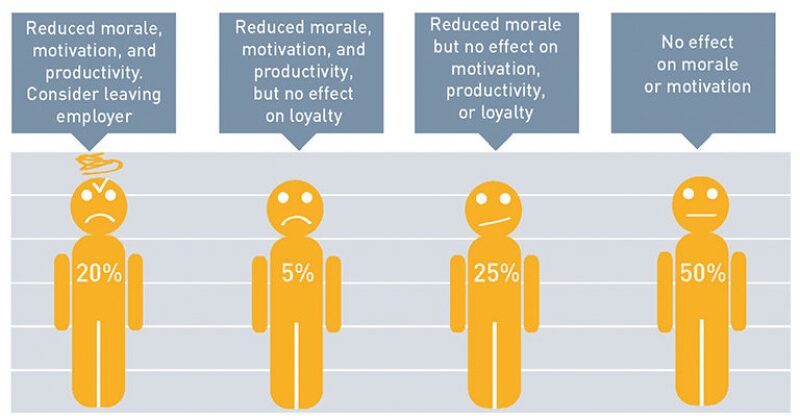
These findings lend credence to the practice of clearly communicating with employees about the corporate view of individual potential. A company can reduce technical workforce’s loss of motivation and attrition by informing employees of the likelihood of future promotion to a management position. Timely, effective communication will allow technically skilled people to dedicate themselves to building expert technical capabilities and technical leadership skills. Focus yields accelerated development and improved project-delivery capabilities. In the survey, 47% of respondents indicated their company had clearly discussed management potential with them, indicating scope for improvement in this area.
For the first 10 years, while your other responsibilities in life are minimal (spouse, children, house, etc.), work on developing your technical skills and building a strong technical base. That will differentiate you from your peers. Expand the effort to build an international network that you can use as an extensive knowledge base. —Sara Akbar, Deputy Chairman and Managing Director, Kuwait Energy Company
Many experienced professionals suggest the need to reinforce the message that success in our industry is driven by technical achievements and corporate differentiation is delivered through technical success. Those building the technical project proposals wield the true power to successfully implement technology that will be needed to supply the world’s rising energy demand.
Managers’ Responses
The 1,116 managerial ladder respondents held at least 10 years of experience, half with more than 26 years of experience. Almost all respondents from the management pool began as technical specialists and later moved to managerial roles. One-third of this group stated that their first managerial role suited their technical and leadership competence, while 60% confessed that they had to quickly develop their managerial skill set in their new position.
Are Technical Skills Important? Managerial respondents believe it is possible to be ready for a managerial career much earlier than technical respondents. Fewer than one-third of managers think 11 years of industry experience is required, while two-thirds of technical respondents believe this level of experience is necessary ( Fig. 4 ). Previous YP surveys indicate that YPs felt ready for management within 6–10 years, but expected their manager to have at least 15 years of technical experience (Tealdi 2006).
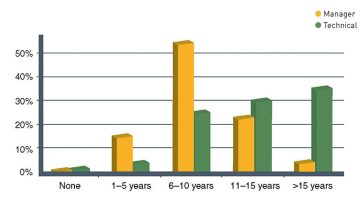
It is important that YPs are realistic about their technical or managerial capabilities and potential. If an employee is uncertain about his or her potential, it is valuable to solicit feedback at peer and senior levels. An excellent way to develop leadership skill is to lead a committee in a nonprofit or professional society such as SPE. Technical and communication skills can be enhanced by writing and presenting technical papers.
Rotate within the organization. Remaining for a long period of time within one area could prevent you from seeing things in a broader perspective. The balance from diving deep into one technology area vs. moving on to other technologies is crucial. —Øystein Arvid Håland, StatoilHydro, Subsurface Technology Senior Vice President
Many managerial respondents find YPs’ impatience to manage others too ambitious. One respondent put it, “I have seen too many managers with an insufficient base of technical knowledge, which generally results in mediocre leadership with poor technical skills.” Many other respondents strongly recommended that YPs strive to balance what both career ladders have to offer. “Be sure you understand the huge time and effort required to manage people, in their jobs and their personal lives,” adds another respondent.
Our past surveys illustrate that roughly two of every three YPs are keen to pursue a managerial career when just one of three will ever make it (Tealdi 2005; 2005a; 2006; Tremblay 1998). One of our respondents added, “Young people should realize that for every 10 to 15 employees, only one will progress through his/her entire career as a manager; competition for jobs up the ladder becomes very intense and requires a large commitment.” Another respondent adds, “In a managerial environment, it is very difficult to keep a technical edge, especially if you have not built a very strong base previously. This makes you more exposed during a downturn and reduces your chances to move back to the technical ladder.”
Build a broad vision. Develop your nontechnical skills. Get leadership experience. This survey shows that a solid technical foundation remains a vital part of a successful career regardless of career path. Another commonality across all career paths is the need to develop leadership skills. There are common leadership skills that can be applied to leading by influence in a multidisciplinary team or leading a business unit. It is important during the first 5–10 years of one’s career to focus on building technical and leadership skills to prepare for any future challenge.
Many YPs look up to their first-level supervisor and aspire to that position. Taking that promotion too early can result in getting stuck at that level in the company. The funnel to get to the next higher levels on the corporate management ladder is quite steep and narrow. Only those with the best technical business delivery skills will have a shot. —Robert Heinemann, Chief Executive Officer (CEO) of Berry Petroleu
Respondents from both ladders agreed that higher education is not a requirement to become a manager. Only 6% of managers and 5% of technical professionals felt an MBA is a prerequisite to a move to management. Only 13% of managers and 17% of technical professionals felt an MSc was prerequisite. Although neither an MBA nor an MSc seems to be considered a requirement, respondents stated that it is beneficial to pursue some type of management training as a structured approach to human resources, finance, and strategy does prove useful in the long term.
The Reason for it all. The most alluring aspect of management appears to be the power to influence the organization’s decisions and steer the corporate direction. Both technical and managerial respondents agree that managers wield more influence over corporate decisions. Managers were markedly more confident, with 74% indicating that they were in control, and only 45% of technical professionals agreeing. When asked if technical people had more influence, 25% of those on the technical ladder and only 6% of managers agreed (Fig. 5).
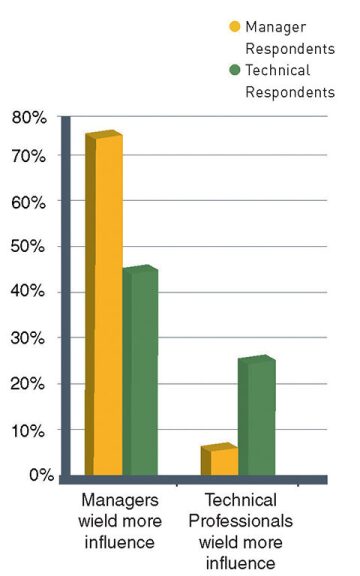
Striking a Balance, Charting a Course. Many tradeoffs must be considered in charting a career path. Past survey responses indicate that work/life balance is a primary motivating factor for YPs (Fig. 6). Respondents from both sides agree that technical roles offer better work/life balance. Both groups also agreed that technical ladder jobs are more secure than managerial jobs by a ratio of more than 5 to 1. Survey respondents have seen that managers with 11–15 years of solid technical experience can return to a technical role when times get tough or managerial jobs are not available.
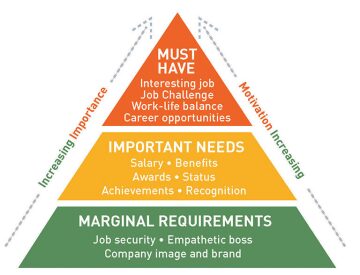
Moving Back. When management respondents were queried about whether they would consider a move back to a technical career, only 21% expressed interest (Fig. 7). The main reason was a lack of technical competencies because of a premature move into management or because financial packages were too established to risk, even if they miss their role as technicians. As one respondent commented, “I sometimes miss the rewarding feeling that is obtained by solving challenging technical problems. As a manager you get to be a part of that but it is not the same as being the one doing the work. On the other hand, managing allows you have a larger role in setting team direction and most importantly in helping to advance promising careers.”

How Can SPE Help?
SPE offers a range of volunteer activities and programs designed to help YPs build a solid technical foundation and hone soft skills. Networking, public speaking, managing international teams, and constantly changing responsibilities are very common among our volunteers’ commitments. “Encourage YP participation in SPE, particularly as authors of papers and publications. I believe that earning professional recognition from one’s peers is critical for encouragement of young engineers to stay in a tech field,” one respondent stated.
This industry has a virtually infinite thirst for top-quality technical people. These people will be the most insulated in an industry downturn and most rewarded in an upturn. —Robert Heinemann, CEO, Berry Petroleum
SPE also plays a role in developing leadership skills that are valuable on any career path. As one of our respondents advised, “Volunteer for committees and leadership positions at SPE sections and other volunteer organizations. If you can lead volunteers, you can lead in a company.”
Conclusions
In an increasingly competitive talent market, competitive salary and benefits packages attract the best and brightest. Responses in this survey indicate that additional measures can be taken to attract, retain, motivate, and empower employees (Etkind et al. 2008). The attractive factors of the managerial career path need to be balanced against compelling benefits for technical leadership, and they need not be the same. One of the most powerful mechanisms available to companies is clear and open communication on career aspirations and potential. Respondents indicate that it is possible to drastically reduce the number of employees considering an exit to pursue managerial aspirations by having a candid discussion about career potential.
Being an SPE member opened a new world of connections for me. Read the literature and stay technologically up to date. Use SPE to build interpersonal skills like conflict management. Improve your written and verbal communication skills, and understand the personality types of your colleagues to improve collaborative results. —Klaus Potsch, Leader of the RE Group at OMV and former SPE Regional Director
This article offers a window into the personal perspectives of thousands of young and experienced industry professionals providing insight into drivers behind career aspirations and career evolution. Respondents have indicated that status and the power to control corporate direction and strategy are the primary attractions to a management career. Companies and SPE can do more to increase the technical professional career profile by recognizing individuals who perform the work to enable project success. The industry can also do more to inform YPs about the realities of life on the managerial career ladder.
In conclusion, professionals of all ages recognize the value of spending the first 5–15 years of a career focusing on building a broad technical foundation and deep expertise combined with leadership and soft skills. Such a disciplined background will deliver enhanced flexibility, job security, and greater respect from peers and direct reports. So, volunteer with SPE to enhance your soft skills and leadership capabilities, and author, present, and read technical papers to build your technical communication competencies. The tools are there for you; don’t hesitate! TWA
The foundation of success in the oil and gas industry comes from successful implementation of technical solutions. Over the course of a career, it is extremely important to develop a key technical expertise. Find out what your company is made of, key strengths and weaknesses, to help you focus your energy in improving in these fundamental technical areas. —Claudio de la Cerda, Vice President, Data Consulting Services, Schlumberger
References
- Tealdi, L. 2005. Job market in the Oil and Gas Business. TWA 1 (1): 9–13.
- Tealdi, L. 2005a. Careers in Oil and Gas Business. TWA 1 (2): 10–13.
- Tealdi, L. 2006. Changing Career Directions. TWA 2 (1): 7–9.
- Tremblay, M. 1998. Determinants of Desired Career Paths Among Canadian Engineers. Cirano Scientific Series.
- Etkind, J., Thomas, T., Tealdi, L., Donachie, J., and Beugelsdijk, L. 2008. Eyes on the Horizon – Engaging, Motivating, and Developing Energy Industry Young Professionals. Paper presented at the World Petroleum Congress, Madrid, Spain, 2 July.

